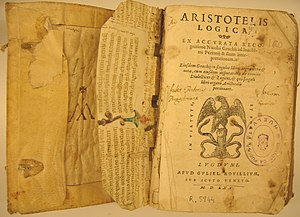 The history of logic is the study of the development of the science of valid inference (logic). While many cultures have employed intricate systems of reasoning, and logical methods are evident in all human thought, an explicit analysis of the principles of reasoning was developed only in three traditions: those of China, India, and Greece. Of these, only the treatment of logic descending from the Greek tradition, particularly Aristotelian logic, found wide application and acceptance in science and mathematics. The Greek tradition was further developed by Islamic logicians and then medieval European logicians. Not until the 19th century does the next great advance in logic arise, with the development of symbolic logic by George Boole and its subsequent development into formal calculable logical systems by Gottlob Frege and set theorists such as Georg Cantor and Giuseppe Peano, ushering in the Information Age.
The history of logic is the study of the development of the science of valid inference (logic). While many cultures have employed intricate systems of reasoning, and logical methods are evident in all human thought, an explicit analysis of the principles of reasoning was developed only in three traditions: those of China, India, and Greece. Of these, only the treatment of logic descending from the Greek tradition, particularly Aristotelian logic, found wide application and acceptance in science and mathematics. The Greek tradition was further developed by Islamic logicians and then medieval European logicians. Not until the 19th century does the next great advance in logic arise, with the development of symbolic logic by George Boole and its subsequent development into formal calculable logical systems by Gottlob Frege and set theorists such as Georg Cantor and Giuseppe Peano, ushering in the Information Age.
Logic was known as 'dialectic' or 'analytic' in Ancient Greece. The word 'logic' (from the Greek logos, meaning discourse or sentence) does not appear in the modern sense until the commentaries of Alexander of Aphrodisias, writing in the third century A.D.
Logic (from Classical Greek λόγος logos; meaning 'speech/word') is the study of the principles and criteria of valid inference and demonstration. The term "logos" was also believed by the Greeks to be the universal power by which all reality was sustained and made coherent and consistent.
As a formal science, logic investigates and classifies the structure of statements and arguments, both through the study of formal systems of inference and through the study of arguments in natural language. The field of logic ranges from core topics such as the study of fallacies and paradoxes, to specialized analysis of reasoning using probability and to arguments involving causality. Logic is also commonly used today in argumentation theory. [1]
Traditionally, logic is studied as a branch of philosophy, one part of the classical trivium, which consisted of grammar, logic, and rhetoric. Since the mid-nineteenth century formal logic has been studied in the context of the foundations of mathematics. In 1910 Bertrand Russell and Alfred North Whitehead attempted to establish logic as the cornerstone of mathematics formally with the publication of Principia Mathematica. However, the system of Principia is no longer much used, having been largely supplanted by set theory. The development of formal logic and its implementation in computing machinery is the foundation of computer science.
| < Prev | Next > |
|---|
